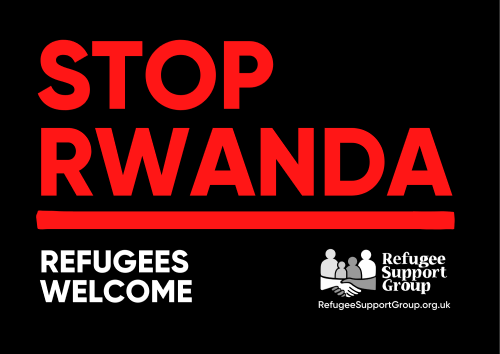On the 19th of December 2022, the High Court ruled that the UK government’s plan to send asylum seekers to Rwanda is legal.
By Nadia Kashoo, Advocacy Volunteer
What is the Rwanda Plan?
The Rwanda plan is an immigration policy designed to send those identified as ‘illegal immigrants or asylum seekers’ to Rwanda for processing, asylum and then resettlement. It has been frequently referred to as a ‘one-way ticket’, with current Prime Minister Rishi Sunak emphasising that whether the individual’s claim to asylum in Rwanda is successful or not, the individual will not return to the UK.
The plan is highly controversial and under intense criticism, including from the United Nations High Commission for Refugees. The Rwanda plan has been strongly opposed by the House of Lords, and has faced numerous legal challenges. While the first flight was due to take place in June 2022, this flight was barred from taking place by an urgent interim measure issued by the European Court of Human Rights. The basis for the decision, they said, was that one of the passengers would face a real risk of ‘irreversible harm’ if sent to Rwanda.
The Rwanda plan also poses serious risks to the safety of children.
Whilst the government has said that it will not send unaccompanied children to Rwanda, numerous cases are being identified of children being wrongly identified as adults as part of serious wider issues surrounding incorrect age assessments. As a result, children are becoming eligible for the offshoring programme. We saw this take place in June 2022, when three children that the Home Office wrongly declared to be adults were detained and prepared for offshoring.
These errors pose serious risks to the safety of children; notably because Rwanda, alongside being recognised as dangerous for LGBTQ+ individuals, has been identified as both a source and transit country for human trafficking and child exploitation. The 2019 Social Institutions and Gender Index states that ‘Rwanda is a source and transit country for human trafficking, with Rwandan women and girls exploited in domestic service or in the commercial sex trade, and refugees from Burundi and the DRC trafficked into the sex trade as they transit through Rwanda’. They added that ‘refugee women and girls, particularly those in refugee camps, are at a disproportionate risk of GBV, including “survival sex” in exchange for food or water, and human trafficking’.
What did the High Court decide?
On the 19th December 2022, the High Court was faced with the question of whether the Home Secretary’s classification of Rwanda as a ‘safe country’ was a lawful one. In tackling this question, the Court needed to assess whether a legal flaw had taken place in this decision, but the Court’s task was not to assess the question of whether Rwanda is a safe country itself. The claimants presented a series of arguments, none of which were ultimately successful.
One argument presented was that the plan breaches two articles of the 1951 Refugee Convention prescribing that i) refugees should not be penalised for illegal entry and ii) that they should not be expelled to a territory within which their lives will be in danger. Another argued that the Rwanda plan demonstrates clear discrimination against young men on the basis of sex, age and nationality, notably that it was unlawful and discriminatory to make special provisions for refugees coming from Ukraine. Another argument was presented on the basis of procedural fairness: the lack of opportunity to explain why they had not claimed asylum in the countries that they passed through prior to arriving in the UK, and why Rwanda will not be a safe country for them as an individual.
The court did decide, however, that ‘the Home Secretary must consider properly the circumstances of each individual claimant’ in order to decide whether the asylum claim should be heard in the UK and whether they should not be relocated to Rwanda. The court concluded that the Home Secretary had not properly considered the cases of the eight individuals claimants who brought the legal challenge, and obliged her to reconsider their cases. For more information on the court’s reasoning, read Free Movement’s article here.
What can we do?
While this decision is hugely disappointing, there are many actions that we can still take to prevent the Rwanda plan from going ahead:
1. Support the Appeals
As highlighted by Free Movement, the decision of the High Court is likely to be appealed at both Court of Appeal and Supreme Court level. The High Court decision is not the last word. In the meantime, removals to Rwanda cannot take place, and they will not take place until three weeks after the delivery of the final domestic decision in ongoing judicial review proceedings. Make sure to follow these next steps, and to support The Public and Commercial Services Union, Detention Action and Care4Calais as they bring their appeal forward.
2. Write to your MP
Writing an email or letter to your MP can help to raise the Rwanda issue in Parliament. You can voice your concerns using either your own words, or by using Asylum Welcome’s template. You can find the Members of Parliament for Berkshire here.
3. Put Pressure on Private Airlines
Public scrutiny and campaigning has been successful in putting pressure on private airlines to withdraw from the Rwanda deal, one notable withdrawal being Privilege Style. We now need to apply this pressure to Hi Fly and Iberojet Air.
You can voice your opposition through Freedom of Torture’s quick and easy email template, or through social media: @hifly_airline on Instagram and Twitter, @iberojetair_es on Instagram and Twitter.
4. ‘But what’s the alternative?’
Despite what the government has said, the Rwanda plan does not have the backing of the public. A YouGov poll taken in April 2022 showed that the majority of people opposed the plan. A subsequent poll taken in December 2022 shows that ‘a majority of Labour voters think it should be made easier for people to apply for asylum in Britain from overseas, so they don’t need to try and cross the Channel in boats.’ To learn more about what such alternatives to the Rwanda plan might look like, read Colin Yeo’s thread here. You’ll be ready with a response the next time someone says there’s no alternative!





